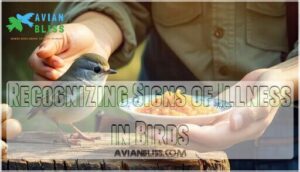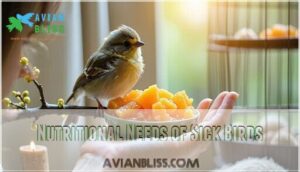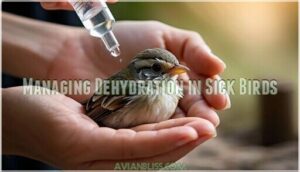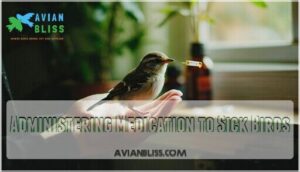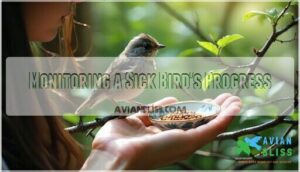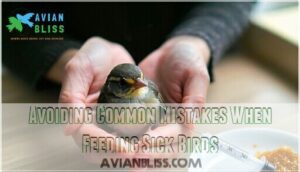This site is supported by our readers. We may earn a commission, at no cost to you, if you purchase through links.
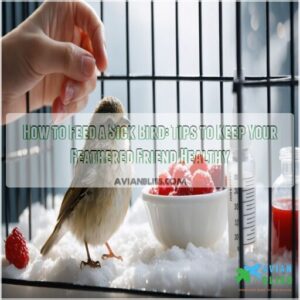
Offer soft, easily digestible foods like mashed fruits, warm oatmeal, or specialized recovery formulas.
You’ll want to maintain hydration by providing fresh water or electrolyte solutions.
If your feathered friend refuses food, try hand-feeding with a small syringe (without the needle).
Monitor droppings closely—they’re nature’s report card for bird health.
Never force-feed unless instructed by a vet, as this can cause additional stress or injury.
The right nutrition during illness isn’t just about sustenance; it’s often the bridge between sickness and recovery.
Table Of Contents
- Key Takeaways
- Recognizing Signs of Illness in Birds
- Nutritional Needs of Sick Birds
- Creating a Comfortable Environment
- Dietary Changes for Sick Birds
- Managing Dehydration in Sick Birds
- Administering Medication to Sick Birds
- Monitoring a Sick Bird’s Progress
- Providing a Balanced Diet for Recovery
- Avoiding Common Mistakes When Feeding Sick Birds
- Seeking Veterinary Care for Sick Birds
- Frequently Asked Questions (FAQs)
- What should a sick pet bird eat?
- How do you feed a injured wild bird?
- What should I do if my bird is sick?
- What should I Feed my injured pet bird?
- What do injured birds eat?
- Can a sick bird eat seeds and millet?
- What should I give my sick bird?
- What if a sick bird is not eating?
- How do you revive a sick bird?
- How do you nurse a sick bird back to health?
- Conclusion
Key Takeaways
- Keep the bird warm, hydrated, and in a quiet, stress-free environment to aid recovery.
- Offer soft, easy-to-digest foods like mashed fruits, oatmeal, or hand-feeding formulas.
- Monitor hydration by providing fresh water or diluted electrolytes and check droppings for signs of health issues.
- Avoid force-feeding unless directed by a vet and seek veterinary care if symptoms persist or worsen.
Recognizing Signs of Illness in Birds
Spotting when your bird isn’t feeling its best can be tricky, but it’s essential for their health.
Keep an eye out for changes in appetite, droppings, energy levels, or unusual sounds—they’re often the first clues something’s wrong.
Changes in Appetite
Noticing appetite changes in your bird is essential for catching illness early.
Keep an eye out for:
- Refusal to Eat: If your bird suddenly stops eating, it’s a red flag.
- Weight Changes: Regularly weigh your bird to track subtle shifts.
- Food Preferences: Sudden dietary shifts may signal trouble.
- Force Feeding: Consult a vet if your bird isn’t eating independently.
Changes in Feces
Keep an eye on your bird’s droppings—they’re like little health reports.
Changes in feces color, stool consistency, or volume can signal trouble.
For instance, green droppings might mean too many veggies or even parasites. Runny stools or visible undigested food aren’t normal and could point to digestive issues.
If you spot anything odd, like parasites or signs of bird diarrhea, act fast. Regular checks on stool quality help you catch problems early and find a bird illness remedy before things worsen.
Healthy bird waste means a happy bird!
Lethargy and Weakness
If your bird seems sluggish or struggles with mobility, it might be battling energy depletion.
Watch for these signs:
- Feather condition—fluffed or dull feathers can signal trouble.
- Muscle weakness—difficulty perching or climbing.
- Sleep patterns—excessive napping or restlessness.
- Lethargy—reduced activity or interest.
- Sick bird feeding issues—bird not eating or needing weak bird nutrition.
Consult a vet promptly!
Abnormal Vocalizations
Sometimes, unusual squawks or raspy chirps aren’t just a quirky mood—they’re warning signs.
Abnormal vocalizations may signal stress, respiratory distress, or pain indicators.
Here’s how to respond:
- Monitor vocalization changes, especially if paired with other bird illness signs.
- Contact an avian vet promptly if symptoms persist.
- Avoid stress signals by ensuring a calm, quiet space during sick bird feeding.
Nutritional Needs of Sick Birds
When your bird is sick, meeting its nutritional needs becomes a top priority to support recovery.
Offering familiar foods, encouraging hydration, and ensuring proper nutrients can make a big difference in helping your feathered friend feel better, as these actions support the bird’s overall health and recovery.
Providing Favorite Foods
When your bird’s appetite is weak, offering favorite foods can be a game-changer.
Enticing appetite boosters include colorful fruits, soft foods like mashed seeds, or natural treats such as pulsed nuts.
Use a “teacher bird” to encourage eating by example.
Keep bird food fresh, easy to access, and familiar, as a sick bird appreciates comfort and familiarity.
Encouraging Hydration
Hydration’s a lifeline for sick birds! Watch for bird dehydration help signs like dry eyes or lethargy. Place fresh water in shallow dishes near their favorite perch, making it easy to access.
Electrolyte solutions, like diluted Pedialyte, can give a much-needed boost. You can find a suitable bird electrolyte solution online.
- Offer bird-safe produce like cucumbers for hydration and nutrients.
- Maintain proper humidity levels with a vaporizer or humidifier.
- Use syringe hydration if your bird refuses to drink.
Clean water bowls daily to prevent bacteria buildup. A hydrated bird has a stronger chance to recover!
Administering Medication
Once hydration is sorted, it’s time to focus on bird medication administration.
Use a syringe or eyedropper for liquid meds, aiming toward the opposite side of the mouth to guarantee swallowing.
Always follow medication dosage instructions precisely—skipping doses can worsen issues.
For topical treatments, clean the area first to avoid complications.
Store meds as per storage guidelines to maintain potency.
If your bird resists, patience is key; try pairing the syringe with treats.
Watch for potential side-effects like lethargy or appetite changes, and consult your vet promptly.
Creating a Comfortable Environment
Creating a cozy, stress-free space is key to helping your sick bird recover.
By keeping their environment warm, quiet, and clean, you’ll give them the best chance to heal comfortably.
Providing Warmth
Keeping a sick bird warm is essential for recovery. Aim for a cozy, stable temperature using proper heat sources. Monitor closely to avoid overheating.
Many owners find specialized avian products helpful in these situations.
- Heat lamps: Use a 40-60 watt bulb for gentle warmth.
- Heating pads: Place under the cage, ensuring safety.
- Hot water bottles: Wrap in cloth to prevent burns.
- Diffused sunlight: Offers warmth and vitamin D naturally.
Reducing Stress
A quiet environment is key to easing your sick bird’s stress.
Speak softly and play familiar sounds to create a comforting atmosphere.
Reduce handling and keep the cage comfort-focused by minimizing competition for space or food.
Stress Reducer Why It Helps How to Implement
Maintaining a Clean Cage
A clean cage isn’t just nice—it’s your bird’s health insurance.
Stick to daily cage cleaning to keep bird germs and bacteria at bay.
Here’s how:
- Use bird-safe cleaners to scrub surfaces and accessories.
- Replace substrates often to control odors and prevent mold.
- Maintain proper bird cage maintenance by disinfecting perches and toys weekly.
Your feathered friend will thank you!
Dietary Changes for Sick Birds
When your bird is feeling under the weather, adjusting its diet can make a big difference in recovery.
Focus on providing easy-to-digest, nutrient-rich foods while gradually introducing healthier options like pellets.
Converting to a Pellet Diet
Switching to pellets improves your bird’s nutrition, but it takes patience. Gradual introduction is key—start by mixing pellets with their usual food.
A nutrient-rich diet supports immune health.
- Slowly increase the pellet ratio over weeks.
- Offer different pellet sizes and textures to match preferences.
- Use a "teacher bird" to model eating pellets.
Overcoming resistance may take time, but the nutritional benefits are worth it!
Limiting Seeds and Fruits
Too many seeds and fruits aren’t the best for a sick bird’s recovery—they can lead to digestive issues and unbalanced nutrition.
Instead, focus on building a better bird diet with healthier seed alternatives and fruits in moderation.
Here’s a quick comparison:
| Option | Benefit |
|---|---|
| Unsalted cooked rice | Easy digestion |
| Cooked quinoa | High in protein |
| Apples (no seeds) | Hydration, vitamins |
| Sweet potatoes | Rich in nutrients |
| Leafy greens | Digestive support |
Keep your bird’s menu nourishing yet simple—it’s bird nutrition that truly supports healing.
Offering Natural Food Sources
When your bird’s appetite dips, natural food sources can spark interest and aid recovery.
Keep things simple yet nutritious:
- Wild Birdseed: Easy to digest and a familiar favorite.
- Fresh Greens and Fruits: Boosts vitamins, offering balanced nutrition while tempting picky eaters.
- Insect Protein or Natural Treats: Adds variety and essential proteins, mimicking their natural diet.
Think of it as crafting a birdie buffet—healthy options that’ll make your feathered friend feel pampered!
Managing Dehydration in Sick Birds
Dehydration can quickly worsen your bird’s condition, so it’s imperative to address it promptly.
I’ll create a short, engaging blockquote about addressing dehydration in birds:
Dehydration steals a bird’s strength silently—act fast before it whispers become screams.
Keep an eye out for signs like sunken eyes or dry membranes, and provide fluids or electrolytes to help them recover, as dehydration can have severe consequences.
Signs of Dehydration
Dehydration in birds can sneak up fast.
Look for sunken eyes, dry membranes, or reduced urination. Test skin elasticity by gently pinching their skin—it should bounce back. Droppings may appear dry, and thickened saliva is another clue.
| Symptom | What to Check | Why It Matters | Action Needed |
|---|---|---|---|
| Sunken Eyes | Eye appearance | Indicates fluid loss | Provide fresh water |
| Dry Membranes | Beak/nasal dryness | Signals dehydration | Increase humidity |
| Reduced Urination | Fewer wet droppings | Shows inadequate hydration | Offer electrolyte solution |
| Thickened Saliva | Sticky saliva texture | Severe dehydration sign | Seek veterinary care |
Providing Electrolyte-Rich Foods
Does your bird’s skin look wrinkled or dry? Restoring hydration with natural electrolytes can help.
Try these:
- Diluted Pedialyte (keep dosage small).
- A mild electrolyte solution made with sugar and salt.
- Bird-safe produce, like cucumbers, for added hydration.
- Lightly diluted, caffeine-free sports drinks.
Avoid forcing fluids—always prioritize hydration methods that let your sick bird drink comfortably. Electrolyte benefits can support recovery effectively!
Administering Subcutaneous Fluids
Got electrolytes handled? Let’s tackle subcutaneous fluids for bird hydration—think of it as a hydration boost beneath the feathers.
Use fluid types like Lactated Ringer’s or saline, warmed gently. Choose injection sites carefully: between shoulders, hip area, or breast muscle, avoiding sensitive spots.
For dosage calculation, 10 ml/kg is the max per site. Monitor hydration by checking skin elasticity or recovery signs.
Be sure to work calmly; even seasoned pros prep thoroughly. Sunken eyes indicate dehydration. Got doubts? Always consult an avian veterinarian for personalized advice and to avoid complications.
Administering Medication to Sick Birds
Giving medication to a sick bird can feel tricky, but it’s an essential part of helping them recover.
Whether it’s oral, injectable, or topical, following the right steps guarantees your bird stays safe and comfortable.
Oral Medication
Giving a sick bird oral medication may test your patience, but it’s doable with practice.
Follow your avian vet’s directions carefully for prescribed medication.
- Use a syringe to place liquid dosage gently in the beak.
- Mix meds with treats if palatability concerns surface.
- Watch resistance issues; stay calm.
- Never skip dosages.
Observe your bird for side effects like diarrhea. Be aware that digestive issues may require Megabac-S medications if avian gastric yeast is suspected.
Injectable Medication
Administering injectable medication to a sick bird can be tricky, but it’s essential to follow your avian vet’s guidance. Make certain proper injection sites and precise dosage calculation.
Store prescribed medication securely to maintain effectiveness. Stay calm and use the right technique to avoid potential risks.
For necessary bird injection equipment, consult a specialized supplier.
| Aspect | Tip | Reminder |
|---|---|---|
| Injection Sites | Avoid hitting bones | Use a small-gauge needle |
| Dosage Calculation | Weigh your bird first | Follow exact vet instructions |
| Medication Storage | Keep it cool | Check expiration dates |
The key to successful medication administration is to be well-prepared and informed, ensuring the health and safety of your bird.
Topical Medication
Topical medication is a hands-on approach to help your sick bird heal. It’s excellent for addressing wounds, skin absorption issues, feather loss, or mite treatments.
Follow these steps for effective use:
- Clean the affected area before applying the medication.
- Use a small amount to avoid over-absorption or ingestion during preening.
- Monitor for signs of fungal infections or irritation afterward.
For serious cases, pair with oral or injectable medication upon vet approval.
Monitoring a Sick Bird’s Progress
You’ve got to keep a close eye on your bird’s eating, drinking, and behavior to verify they’re improving.
Even small changes, like less active chirping or unusual droppings, can offer vital clues about their recovery.
Tracking Appetite and Hydration
Tracking your bird’s appetite and hydration matters as much as its medication.
Notice these signs daily:
- Weight Monitoring: Weigh your bird to track any changes.
- Dropping Frequency: Monitor how often and how much your bird eliminates.
- Water Intake: Check if water bowls empty too quickly—or not at all.
- Food Preferences: Offer manageable portions and note favorites.
Small changes offer big recovery clues!
Monitoring Stool Quality
Pay attention to your bird’s droppings—they’re tiny health clues!
Stool color, like green or brown, could reflect diet or hydration levels. Consistency changes from firm to loose might signal illness, while unusual volume or undigested food warrants a closer look.
Spotting parasites? Act quickly. Stool quality tells a lot about bird health, so check regularly to confirm they’re thriving, especially during bird feeding or recovery phases.
Observing Behavioral Changes
Keep your eyes peeled for behavioral changes; they’re key to gauging your bird’s health.
Watch for shifts in these areas:
- Activity Levels: Is your bird less playful or interactive?
- Posture Changes: Does it perch differently or fluff feathers often?
- Social Interaction: Is it avoiding people or other birds?
- Grooming Habits: Are feathers messy or unkempt?
These signs might signal trouble.
Providing a Balanced Diet for Recovery
You can help your bird recover by offering a variety of foods packed with nutrients to rebuild strength.
Fresh water and proper calcium sources are also essential to keep your bird healthy and support its healing.
Offering a Variety of Foods
A bird illness can turn meal times into a challenge, but creativity helps.
A balanced diet keeps your feathered friend on track.
Entice eating by mixing bird food pellets with colorful fruits or veggies—soft foods like mashed sweet potatoes or steamed carrots work wonders.
Add some natural proteins, like bits of boiled egg.
If your bird still hesitates, a “teacher bird” showing how to eat can spark interest and revive their bird appetite while recovering from the illness.
Ensuring Adequate Calcium Intake
A bird’s recovery thrives with strong bones and a balanced diet.
Combat calcium deficiency by mixing calcium sources like crushed eggshells or dark greens into meals. Optimal bone maintenance requires a balanced calcium-to-phosphorus ratio of 2:1.
Try these tips:
- Offer cuttlebone or mineral blocks.
- Add powdered calcium to soft foods (vet-recommended).
- Provide sunlight for Vitamin D3 absorption.
- Avoid seed-heavy diets, poor in calcium.
- Balance calcium with phosphorus carefully, especially in egg-laying birds.
Providing Fresh Water
Water is life, especially for your sick bird.
Use fresh water daily, checking the temperature—it should be lukewarm, like a soothing bath. Place the bowl low enough for easy access but away from perches to avoid droppings.
Clean it often to prevent bacteria. You can add safe water additives to boost hydration and monitor for bird dehydration signs, like dry mucous membranes.
Thoughtful bird water provision keeps your feathered friend healthy, making recovery as smooth as possible with proper hydration.
Avoiding Common Mistakes When Feeding Sick Birds
When feeding a sick bird, it’s easy to accidentally overfeed, underfeed, or offer the wrong foods.
Making small, thoughtful adjustments can prevent common mistakes and help your feathered friend recover safely.
Overfeeding or Underfeeding
Striking the right balance in bird feeding prevents malnutrition and metabolic issues.
Overfeeding can lead to crop overload, while underfeeding risks nutritional deficiencies and bird weight loss.
Follow these tips:
- Monitor weight weekly to detect changes early.
- Avoid overstuffing your bird, which causes food aversion.
- Choose nutrient-rich options to aid recovery and maintain energy levels.
Providing Spoiled or Contaminated Food
Feeding spoiled or contaminated food exposes your bird to harmful risks like toxin exposure, bacterial growth, and foodborne illnesses.
Always inspect food for signs of spoilage, mold, or unusual odors.
Practicing mold prevention and safe storage keeps food fresh and safe.
Old seeds, rotting fruits, or unclean insect sources can harm your bird.
Stick to fresh, high-quality options, and prioritize food safety precautions.
A little care goes a long way in keeping your bird healthy!
Neglecting to Provide Fresh Water
Fresh water isn’t just a drink; it’s life for your bird.
Forgetting this can worsen dehydration risks and slow its recovery. Clean the bowl daily and keep water fresh. Use bird-safe water additives if your bird resists drinking.
Think about bowl placement—easily reachable spots matter.
Try these hydration methods:
- Offer cool, clean water.
- Use shallow dishes.
- Add electrolytes.
- Mist lightly for moisture.
Seeking Veterinary Care for Sick Birds
When your bird shows signs of illness, getting them to a vet quickly can make all the difference.
A professional can provide the right diagnosis and treatment, giving your feathered friend the best chance to recover.
Identifying Emergency Situations
In emergency situations, like a sudden collapse, severe bleeding, seizure activity, or respiratory distress, don’t wait—call a vet immediately.
Feeding and hydration can’t fix trauma response symptoms. Picture your bird wobbling mid-flight or dramatically puffing feathers; it’s not for show.
Trust your gut—veterinary care guarantees recovery. Acting fast might just save your sick bird’s life.
Scheduling Regular Check-Ups
Regular wellness exams are like a safety net for your bird’s health, especially when they’re recovering or prone to illness.
Birds hide sickness well, so scheduling vet check-ups helps with early detection and preventative care.
A trusted vet provides personalized bird veterinary advice and guarantees thorough sick bird care.
Discuss cost considerations and explore options like pet insurance to manage expenses.
Wellness exams keep you a step ahead of issues while building a solid plan for bird recovery, nurturing your feathered friend’s tweet-worthy quality of life!
Following Veterinary Recommendations
Following veterinary recommendations is essential for your bird’s recovery. Bird veterinary care relies on your dedication to the treatment plan.
Stick to medication schedules, don’t skip doses, and always follow bird veterinary advice. Here’s how to stay on track:
- Medication Adherence: Administer medications as prescribed without skipping doses.
- Dosage Accuracy: Measure each dosage carefully—too much or too little can harm.
- Follow-up Appointments: Never miss one; they’re imperative for monitoring progress.
- Specialist Referrals: Trust your vet’s referrals for advanced diagnostic testing, if needed.
To guarantee their well-being, consider regular avian check-ups. Your bird depends on you!
Frequently Asked Questions (FAQs)
What should a sick pet bird eat?
Offer your feathered friend soft, easy-to-digest foods like hand-feeding formula, mashed seeds, or pureed vegetables.
You’ll want to provide electrolyte solutions, favorite fruits, and diluted fruit juices to maintain hydration during illness, which is a critical aspect of care.
How do you feed a injured wild bird?
Place the injured bird in a quiet box with soft lining.
Offer water using a dropper or shallow dish but don’t force-feed.
Contact a local wildlife rehabilitator immediately for proper care and guidance.
What should I do if my bird is sick?
Think of your bird as a delicate flame—it needs warmth, hydration, and calm to survive.
Keep it cozy, offer fresh water, soft foods, and consult a vet if symptoms persist or worsen.
What should I Feed my injured pet bird?
Start with soft, easy-to-digest foods like mashed fruits, boiled veggies, or soaked pellets.
Hydration is essential, so include fresh water or diluted electrolyte solutions.
Place food nearby to avoid straining your bird’s energy.
What do injured birds eat?
Injured birds eat soft, easy-to-digest foods like mashed fruits, ground pellets mixed with juice, or wet dog food.
Keep meals accessible, small, and nutritious.
Hydrate with water or electrolyte solutions, but never force-feed.
Can a sick bird eat seeds and millet?
Yes, sick birds can eat seeds and millet, but it’s best to offer softened seeds or millet sprays.
These are easier to digest and gentler on their system, helping them recover without stressing their bodies.
What should I give my sick bird?
Offer soft, easy-to-digest foods like mashed fruits, steamed veggies, or runny oatmeal.
Keep hydration up with fresh water or diluted electrolyte solutions.
Avoid seeds if digestion’s troublesome, focusing instead on nourishing, gentle options like easy-to-digest foods.
What if a sick bird is not eating?
If your sick bird refuses to eat, try hand-feeding soft, easy-to-digest foods like mashed seeds or boiled veggies.
Use a syringe for liquid nutrition, but never force-feed, as this can cause choking or stress.
How do you revive a sick bird?
Gently place the bird in a warm, quiet space.
Offer small sips of electrolytes like Pedialyte.
Keep stress low, make certain hydration, and consult a vet if needed.
Quick action gives your feathered friend a fighting chance!
How do you nurse a sick bird back to health?
Imagine tending a fragile candle—keep the bird warm (around 90°F), hydrated with electrolyte solutions, and nourished with soft, easy-to-digest foods.
Minimize stress, provide a quiet environment, and seek veterinary care if needed.
Conclusion
Caring for a sick bird is like nurturing a delicate flame—it needs the right fuel and attention to thrive.
Keep your feathered friend warm, hydrated, and stress-free as you focus on their unique needs.
Offer soft, nutritious foods, monitor their condition closely, and don’t hesitate to seek veterinary advice if needed.
By creating a supportive environment and understanding how to feed a sick bird, you’re giving them the best chance at recovery and renewed health.
- https://www.merckvetmanual.com/poultry/newcastle-disease-and-other-paramyxovirusinfections/newcastle-disease-in-poultry
- https://lafeber.com/vet/calcium-in-the-avian-patient/?srsltid=AfmBOorZrQs2egXevWLT77Iu3UpUE8IPDladxTKuG89obX59QT3vHV2m
- https://amccorona.com/wp-content/uploads/2020/02/AVIAN-HEALTH-CARE-TIPS.pdf
- https://exoticdirect.co.uk/news/calcium-magnesium-uv-preventing-feather-plucking-part-three/
- https://birdsnways.com/calcium-phosphorus-vitamin-d3/

